formerly eScholarship Editions


|
|
|
|
Your search for
'Medicine' in subject
found 76 book(s). | Modify Search | Displaying 41 - 60 of 76 book(s) | |
| 41. |  | Title: The king's midwife: a history and mystery of Madame du Coudray Author: Gelbart, Nina Rattner Published: University of California Press, 1998 Subjects: History | European History | Women's Studies | Autobiographies and Biographies | French Studies | History and Philosophy of Science | Medicine Publisher's Description: This unorthodox biography explores the life of an extraordinary Enlightenment woman who, by sheer force of character, parlayed a skill in midwifery into a national institution. In 1759, in an effort to end infant mortality, Louis XV commissioned Madame Angélique Marguerite Le Boursier du Coudray to travel throughout France teaching the art of childbirth to illiterate peasant women. For the next thirty years, this royal emissary taught in nearly forty cities and reached an estimated ten thousand students. She wrote a textbook and invented a life-sized obstetrical mannequin for her demonstrations. She contributed significantly to France's demographic upswing after 1760.Who was the woman, both the private self and the pseudonymous public celebrity? Nina Rattner Gelbart reconstructs Madame du Coudray's astonishing mission through extensive research in the hundreds of letters by, to, and about her in provincial archives throughout France. Tracing her subject's footsteps around the country, Gelbart chronicles du Coudray's battles with finance ministers, village matrons, local administrators, and recalcitrant physicians, her rises in power and falls from grace, and her death at the height of the Reign of Terror. At a deeper level, Gelbart recaptures du Coudray's interior journey as well, by questioning and dismantling the neat paper trail that the great midwife so carefully left behind. Delightfully written, this tale of a fascinating life at the end of the French Old Regime sheds new light on the histories of medicine, gender, society, politics, and culture. [brief] Similar Items |
| 42. | 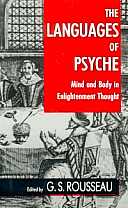 | Title: The Languages of psyche: mind and body in Enlightenment thought: Clark Library lectures, 1985-1986 Author: Rousseau, G. S. (George Sebastian) Published: University of California Press, 1991 Subjects: History | Medicine | History and Philosophy of Science | European History | European Literature Publisher's Description: The Languages of Psyche traces the dualism of mind and body during the "long eighteenth century," from the Restoration in England to the aftermath of the French Revolution. Ten outstanding scholars investigate the complex mind-body relationship in a variety of Enlightenment contexts - science, medicine, philosophy, literature, and everyday society. No other recent book provides such an in-depth, suggestive resource for philosophers, literary critics, intellectual and social historians, and all who are interested in Enlightenment studies. [brief] Similar Items |
| 43. | 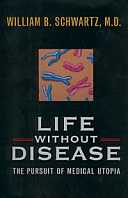 | Title: Life without disease: the pursuit of medical utopia Author: Schwartz, William B 1922- Published: University of California Press, 1998 Subjects: Science | Medicine | Economics and Business | History and Philosophy of Science | Public Policy Publisher's Description: The chaotic state of today's health care is the result of an explosion of effective medical technologies. Rising costs will continue to trouble U.S. health care in the coming decades, but new molecular strategies may eventually contain costs. As life expectancy is dramatically extended by molecular medicine, a growing population of the aged will bring new problems. In the next fifty years genetic intervention will shift the focus of medicine in the United States from repairing the ravages of disease to preventing the onset of disease. Understanding the role of genes in human health, says Dr. William B. Schwartz, is the driving force that will change the direction of medical care, and the age-old dream of life without disease may come close to realization by the middle of the next century. Medical care in 2050 will be vastly more effective, Schwartz maintains, and it may also be less expensive than the resource-intensive procedures such as coronary bypass surgery that medicine relies on today.Schwartz's alluring prospect of a medical utopia raises urgent questions, however. What are the scientific and public policy obstacles that must be overcome if such a goal is to become a reality? Restrictions on access imposed by managed care plans, the corporatization of charitable health care institutions, the increasing numbers of citizens without health insurance, the problems with malpractice insurance, and the threatened Medicare bankruptcy - all are the legacy of medicine's great progress in mastering the human body and society's inability to assimilate that mastery into existing economic, ethical, and legal structures. And if the average American life span is 130 years, a genuine possibility by 2050, what social and economic problems will result?Schwartz examines the forces that have brought us to the current health care state and shows how those same forces will exert themselves in the decades ahead. Focusing on the inextricable link between scientific progress and health policy, he encourages a careful examination of these two forces in order to determine the kind of medical utopia that awaits us. The decisions we make will affect not only our own care, but also the system of care we bequeath to our children. [brief] Similar Items |
| 44. | 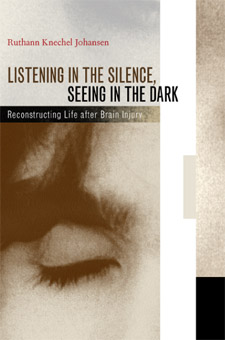 | Title: Listening in the silence, seeing in the dark: reconstructing life after brain injury Author: Johansen, Ruthann Knechel 1942- Published: University of California Press, 2002 Subjects: Medicine | Health Care | Autobiographies and Biographies | Medical Anthropology | Psychiatry Publisher's Description: Traumatic brain injury can interrupt without warning the life story that any one of us is in the midst of creating. When the author's fifteen-year-old son survives a terrible car crash in spite of massive trauma to his brain, she and her family know only that his story has not ended. Their efforts, Erik's own efforts, and those of everyone who helps bring him from deep coma to new life make up a moving and inspiring story for us all, one that invites us to reconsider the very nature of "self" and selfhood. Ruthann Knechel Johansen, who teaches literature and narrative theory, is a particularly eloquent witness to the silent space in which her son, confronted with life-shattering injury and surrounded by conflicting narratives about his viability, is somehow reborn. She describes the time of crisis and medical intervention as an hour-by-hour struggle to communicate with the medical world on the one hand and the everyday world of family and friends on the other. None of them knows how much, or even whether, they can communicate with the wounded child who is lost from himself and everything he knew. Through this experience of utter disintegration, Johansen comes to realize that self-identity is molded and sustained by stories. As Erik regains movement and consciousness, his parents, younger sister, doctors, therapists, educators, and friends all contribute to a web of language and narrative that gradually enables his body, mind, and feelings to make sense of their reacquired functions. Like those who know and love him, the young man feels intense grief and anger for the loss of the self he was before the accident, yet he is the first to see continuity where they see only change. The story is breathtaking, because we become involved in the pain and suspense and faith that accompany every birth. Medical and rehabilitation professionals, social workers, psychotherapists, students of narrative, and anyone who has faced life's trauma will find hope in this meditation on selfhood: out of the shambles of profound brain injury and coma can arise fruitful lives and deepened relationships. Keywords: narrative; selfhood; therapy; traumatic brain injury; healing; spirituality; family crisis; children [brief] Similar Items |
| 45. | 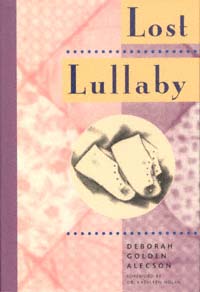 | Title: Lost lullaby Author: Alecson, Deborah Golden 1954- Published: University of California Press, 1995 Subjects: American Studies | Gender Studies | Women's Studies | Medicine | Ethics | Sociology Publisher's Description: Lost Lullaby makes one think the unthinkable: how a loving parent can pray for the death of her child. It is Deborah Alecson's story of her daughter, Andrea, who was born after a full-term, uneventful pregnancy, weighing 7 pounds 11 ounces, perfectly formed and exquisitely featured. But an inexplicable accident at birth left her with massive and irreversible brain damage. On a vitality scale of one to ten, her initial reading was one. And so begins Deborah Alecson's heart-rending struggle to come to terms with two desperately conflicting and powerful emotions: her desire to nurture and love Andrea, and her desire to do everything in her power to bring about her death.Told in a mother's voice, with a simplicity and directness that heighten the intensity of the drama that unfolds, Lost Lullaby reaffirms the human dimension of what is too often an abstract and purely theoretical discussion. During the two months that Andrea spent in the Infant Intensive Care Unit, Ms. Alecson spoke with lawyers, doctors, and ethicists in an effort to understand the legal, medical and ethical implications of her plight. She recounts those discussions and describes legal cases that have a direct bearing on her own situation. Her battle - both in coming to the agonizing decision to let her child die and in convincing the medical and legal establishments to respect that decision - will engender empathy for the plight of many families, and an awareness of the need to use medical technology with restraint. It is a must-read for everyone who cares about how we make life-and-death decisions on these new medical, legal, and moral frontiers. [brief] Similar Items |
| 46. | 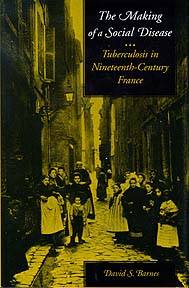 | Title: The making of a social disease;: tuberculosis in nineteenth-century France Author: Barnes, David S Published: University of California Press, 1995 Subjects: History | History and Philosophy of Science | Medicine | European History Publisher's Description: In this first English-language study of popular and scientific responses to tuberculosis in nineteenth-century France, David Barnes provides a much-needed historical perspective on a disease that is making an alarming comeback in the United States and Europe. Barnes argues that French perceptions of the disease - ranging from the early romantic image of a consumptive woman to the later view of a scourge spread by the poor - owed more to the power structures of nineteenth-century society than to medical science. By 1900, the war against tuberculosis had become a war against the dirty habits of the working class.Lucid and original, Barnes's study broadens our understanding of how and why societies assign moral meanings to deadly diseases. [brief] Similar Items |
| 47. | 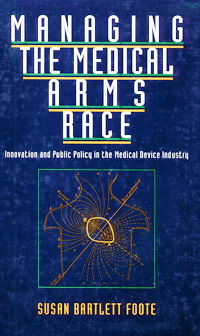 | Title: Managing the medical arms race: public policy and medical device innovation Author: Foote, Susan Bartlett Published: University of California Press, 1992 Subjects: Politics | Medicine | Public Policy | Economics and Business Publisher's Description: The allure of medical innovation is powerful - it holds out the promise of perfect health, the end of pain, the deferral of death. Our insatiable appetite for costly new technologies, fed by a profusion of innovations and the profits they generate, has led to what has been dubbed the medical arms race. During the last several decades government has been called upon to manage the escalation of this race.Foote has written the first comprehensive examination of the profound influence of government policies on medical innovation. She explains how these policies have proliferated to affect every stage of the innovative process in medical device technology - from the first research idea to the patient's bedside. Drawing on case studies of technologies as diverse as lasers, cardiac pacemakers, CT scanners, and IUDs, she traces the interaction between the industry and government institutions, including the National Institutes of Health, the FDA, and the Medicare and Medicaid programs.Public policies during the 1950s and 1960s, Foote discovers, tended to promote innovation, while the regulation and cost controls of the 1970s and 1980s began to inhibit it. For the 1990s and beyond she proposes incremental policy improvements that will rationalize and streamline government intervention. She cautions that we must recognize the limits of medical technology and public policy to cure all ills.Medical innovation is a crucial part of health care reform, a subject of increasing complexity and controversy. Written clearly and accessibly, Managing the Medical Arms Race is an invaluable source for medical, industry, and policy professionals, but it also has much to say to anybody concerned with how we as a society choose to take care of our health. [brief] Similar Items |
| 48. | 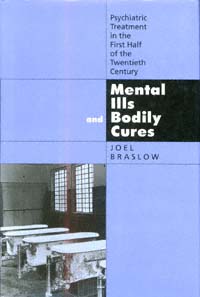 | Title: Mental ills and bodily cures: psychiatric treatment in the first half of the twentieth century Author: Braslow, Joel T 1959- Published: University of California Press, 1997 Subjects: Science | Psychiatry | Medicine | History and Philosophy of Science | Psychology Publisher's Description: Mental Ills and Bodily Cures depicts a time when psychiatric medicine went to lengths we now find extreme and perhaps even brutal ways to heal the mind by treating the body. From a treasure trove of California psychiatric hospital records, including many verbatim transcripts of patient interviews, Joel Braslow masterfully reconstructs the world of mental patients and their doctors in the first half of the twentieth century. Hydrotherapy, sterilization, electroshock, lobotomy, and clitoridectomy - these were among the drastic somatic treatments used in these hospitals.By allowing the would-be healers and those in psychological and physical distress to speak for themselves, Braslow captures the intense and emotional interplay surrounding these therapies. His investigation combines revealing clinical detail with the immediacy of "being there" in the institutional setting while decisions are made, procedures undertaken, and results observed by all those involved. We learn how well-intentioned physicians could rationalize and regard as therapeutic treatments that often had dreadful consequences, and how much the social and cultural world is inscribed within the practice of biological psychiatry. The book will interest historians of medicine, practicing psychiatrists, and everyone who knows or has seen what it's like to be in mental distress. [brief] Similar Items |
| 49. | 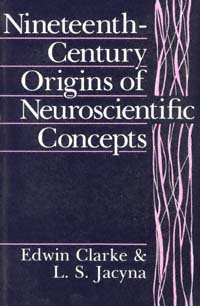 | Title: Nineteenth-century origins of neuroscientific concepts Author: Clarke, Edwin Published: University of California Press, 1992 Subjects: Science | History and Philosophy of Science | Medicine | Ethics Publisher's Description: This book traces the seminal ideas that emerged in the first half of the nineteenth century, when the fundamental concepts of modern neurophysiology and anatomy were formulated in a period of unprecedented scientific discovery. Similar Items |
| 50. | 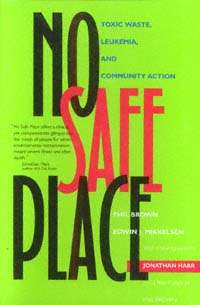 | Title: No safe place: toxic waste, leukemia, and community action Author: Brown, Phil Published: University of California Press, 1997 Subjects: Sociology | American Studies | Ecology | Medicine | Technology and Society Publisher's Description: Toxic waste, contaminated water, cancer clusters - these phrases suggest deception and irresponsibility. But more significantly, they are watchwords for a growing struggle between communities, corporations, and government. In No Safe Place , sociologists, public policy professionals, and activists will learn how residents of Woburn, Massachusetts discovered a childhood leukemia cluster and eventually sued two corporate giants. Their story gives rise to questions important to any concerned citizen: What kind of government regulatory action can control pollution? Just how effective can the recent upsurge of popular participation in science and technology be? Phil Brown, a medical sociologist, and Edwin Mikkelsen, psychiatric consultant to the plaintiffs, look at the Woburn experience in light of similar cases, such as Love Canal, in order to show that toxic waste contamination reveals fundamental flaws in the corporate, governmental, and scientific spheres.The authors strike a humane, constructive note amidst chilling odds, advocating extensive lay involvement based on the Woburn model of civic action. Finally, they propose a safe policy for toxic wastes and governmental/corporate responsibility. Woburn, the authors predict, will become a code word for environmental struggles. [brief] Similar Items |
| 51. |  | Title: Old, alone, and neglected: care of the aged in the United States and Scotland Author: Kayser-Jones, Jeanie Schmit Published: University of California Press, 1990 Subjects: Anthropology | Aging | Medical Anthropology | Medicine Publisher's Description: As the median age of the population increases, the care and housing of the elderly in the U.S. are of increasing concern. Jeanie Kayser-Jones compares a typical private institution in the U.S. with a government-owned home in Scotland.Her analysis compels attention to the systematic abuse of the inst . . . [more] Similar Items |
| 52. | 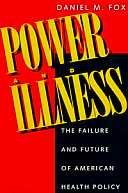 | Title: Power and illness: the failure and future of American health policy Author: Fox, Daniel M Published: University of California Press, 1993 Subjects: Sociology | Medicine | History | American Studies | United States History Publisher's Description: During most of this century, American health policy has emphasized caring for acute conditions rather than preventing and managing chronic illness - even though chronic illness has caused most sickness and death since the 1920s. In this provocative and wide-ranging book, Daniel Fox explains why this has been so and offers a forceful argument for fundamental change in national health care priorities.Fox discusses how ideas about illness and health care, as well as the power of special interest groups, have shaped the ways in which Americans have treated illness. Those who make health policy decisions have increased support for hospitals, physicians, and medical research, believing that people then would become healthier. This position, implemented at considerable cost, has not adequately taken into account the growing burden of chronic disabling illness. While decision makers may have defined chronic disease as a high priority in research, they have not given it such a priority in the financing of health services.The increasing burden of chronic illness is critical. Fox suggests ways to solve this problem without increasing the already high cost of health care - but he does not underestimate the difficulties in such a strategy. Advocating the redistribution of resources within hospital and medical services, he targets those that are redundant or marginally effective.There could be no more timely subject today than American health care. And Daniel Fox is uniquely able to address its problems. A historian of medicine, with knowledge of how hospitals and physicians behave and how health policy is made at government levels, he has extensively researched published and unpublished documents on health care. What he proposes could profoundly affect all Americans. [brief] Similar Items |
| 53. | 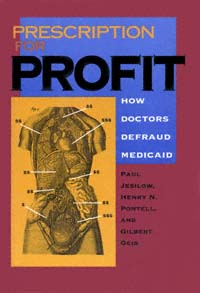 | Title: Prescription for profit: how doctors defraud Medicaid Author: Jesilow, Paul 1950- Published: University of California Press, 1993 Subjects: Science | Sociology | Medicine | Social Problems | Economics and Business Publisher's Description: In this explosive exposé of our health care system, Paul Jesilow, Henry N. Pontell, and Gilbert Geis uncover the dark side of physician practice. Using interviews with doctors and federal, state, and private officials and extensive investigation of case files, they tell the stories of doctors who profit from abortions on women who aren't pregnant, of needless surgery, overcharging for services, and excessive testing.How can doctors, recipients of a sacred trust and sworn to the Hippocratic Oath, violate Medicaid so egregiously? The authors trace patterns of abuse to the program's inauguration in the mid 1960s, when government authorities, not individual patients, were entrusted with responsibility for payments. Determining fees and regulating treatment also became the job of government agencies, thus limiting the doctors' traditional role. Physicians continue to disagree with Medicare and Medicaid policies that infringe on their autonomy and judgment.The medical profession has not accepted the gravity or extent of some members' illegal behavior, and individual doctors continue to blame violations on subordinates and patients. In the meantime, program guidelines have grown more confusing, hamstringing efforts to detect, apprehend, and prosecute Medicaid defrauders. Failure to institute a coherent policy for fraud control in the medical benefit program has allowed self-serving and greedy practitioners to violate the law with impunity. Prescription for Profit is a shocking revelation of abuse within a once-hallowed profession. It is a book that every doctor, and every patient, needs to read this year. [brief] Similar Items |
| 54. | 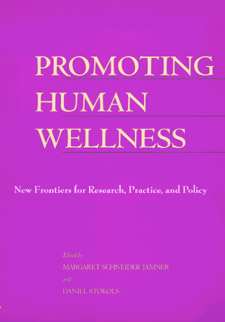 | Title: Promoting human wellness: new frontiers for research, practice, and policy Author: Jamner, Margaret Schneider Published: University of California Press, 2001 Subjects: Medicine | Public Policy | Anthropology | Aging | Education Publisher's Description: This book is a state-of-the-art educational resource on the latest research and public-policy developments in the fields of wellness promotion and disease prevention. Based on award-winning lectures by University of California faculty on nine campuses as part of the Wellness Lectures Program jointly funded by The California Wellness Foundation, Health Net, and the University of California, the volume aims to widen the scope of health care research and policy to promote wellness rather than focus on illness and disease, and to incorporate proactive, interdisciplinary approaches to health care. The volume also contains chapters by distinguished scholars inthe fields of wellness promotion and disease prevention. Many of these articles fall outside the scope of what we conventionally call health promotion, bringing new perspectives to research and policy possibilities. Promoting Human Wellness is organized around core themes such as the importance of disease prevention programs that address multiple health risks, the link between poverty and minority status and disease susceptibility, and the challenge of evaluating health benefits and cost-effectiveness. The articles discuss such timely issues as genetic determinism as a paradigm in wellness promotion, adolescent health promotion and teen pregnancy prevention strategies, racial differences in cancer epidemiology, the California smokers' helpline, strategies for reducing youth violence, HIV/AIDS prevention, domestic violence education and prevention srategies, and the future of women's health research. Presented within the framework of social ecology, several of the chapters in this volume address new ideas and approaches in the wellness field that are only now beginning to be understood such as the social construction of variables including race, class, and gender. Promoting Human Wellness will be essential reading for health practitioners, policymakers, and others seeking to expand the ways we define and achieve health. Keywords: Public health, community health, medicine, nursing, social welfare, health education, health psychology, social ecology, public policy, aging, health promotion. [brief] Similar Items |
| 55. | 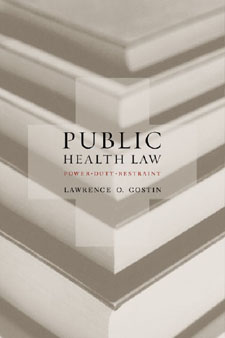 | Title: Public health law: power, duty, restraint Author: Gostin, Larry O. (Larry Ogalthorpe) Published: University of California Press, 2001 Subjects: Law | Medicine | Public Policy Publisher's Description: Gostin's timely book offers the first systematic definition and theory of public health law. Basing his definition on a broad notion of the government's inherent responsibility to advance the population's health and well-being, he develops a rich understanding of the government's fundamental powers and duties. By analyzing constitutional powers and limits, as well as statutory, administrative, and tort law, Public Health Law vividly shows how law can become a potent tool for the realization of a healthier and safer population. [brief] Similar Items |
| 56. | 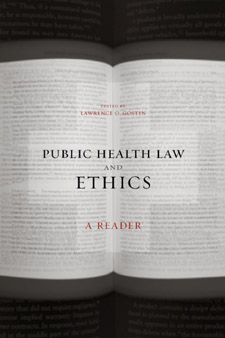 | Title: Public health law and ethics: a reader Author: Gostin, Larry O. (Larry Ogalthorpe) Published: University of California Press, 2002 Subjects: Law | Medicine | Health Care Publisher's Description: This incisive selection of government reports, scholarly articles, and court cases is designed to illuminate the ethical, legal, and political issues in the theory and practice of public health. A companion to the internationally acclaimed Public Health Law: Power, Duty, Restraint, this collection encourages debate and discourse about how courts, scholars, and policy makers respond to the salient legal and ethical dilemmas. The excerpts and commentaries in the reader analyze the legal and constitutional foundations of public health, juxtaposing them with the emerging importance of public health ethics and human rights. The book offers a systematic account of public health law, ethics, and human rights in promoting the common good. Gostin provides thoughtful commentary on the field of public health and carefully explains the meaning and importance of each selection. Scholars, legislators, and public health professionals, as well as faculty and students in schools of law, public health, medicine, nursing, government, and health administration, will benefit from the contemporary case studies covering a wide range of topics from bioterrorism to public health genetics. [brief] Similar Items |
| 57. | 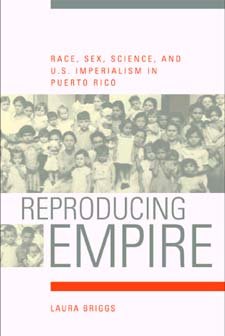 | Title: Reproducing empire: race, sex, science, and U.S. imperialism in Puerto Rico Author: Briggs, Laura 1964- Published: University of California Press, 2003 Subjects: History | Ethnic Studies | Medicine | United States History | Women's Studies | Gender Studies Publisher's Description: Original and compelling, Laura Briggs's Reproducing Empire shows how, for both Puerto Ricans and North Americans, ideologies of sexuality, reproduction, and gender have shaped relations between the island and the mainland. From science to public policy, the "culture of poverty" to overpopulation, feminism to Puerto Rican nationalism, this book uncovers the persistence of concerns about motherhood, prostitution, and family in shaping the beliefs and practices of virtually every player in the twentieth-century drama of Puerto Rican colonialism. In this way, it sheds light on the legacies haunting contemporary debates over globalization. Puerto Rico is a perfect lens through which to examine colonialism and globalization because for the past century it has been where the United States has expressed and fine-tuned its attitudes toward its own expansionism. Puerto Rico's history holds no simple lessons for present-day debate over globalization but does unearth some of its history. Reproducing Empire suggests that interventionist discourses of rescue, family, and sexuality fueled U.S. imperial projects and organized American colonialism. Through the politics, biology, and medicine of eugenics, prostitution, and birth control, the United States has justified its presence in the territory's politics and society. Briggs makes an innovative contribution to Puerto Rican and U.S. history, effectively arguing that gender has been crucial to the relationship between the United States and Puerto Rico, and more broadly, to U.S. expansion elsewhere. [brief] Similar Items |
| 58. | 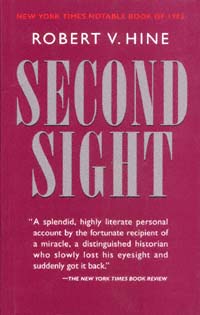 | Title: Second sight Author: Hine, Robert V 1921- Published: University of California Press, 1997 Subjects: Autobiographies and Biographies | Medicine Publisher's Description: He knew he was going blind. Yet he finished graduate school, became a history professor, and wrote books about the American West. Then, nearly fifty, Robert Hine lost his vision completely. Fifteen years later, a risky eye operation restored partial vision, returning Hine to the world of the sighted. "The trauma seemed instructive enough" for him to begin a journal.That journal is the heart of Second Sight, a sensitively written account of Hine's journey into darkness and out again. The first parts are told simply, with little anguish. The emotion comes when sight returns; like a child he discovers the world anew - the intensity of colors, the sadness of faces grown older, the renewed excitement of sex and the body.With the understanding and insights that come from living on both sides of the divide, Hine ponders the meaning of blindness. His search is enriched by a discourse with other blind writers, humorist James Thurber, novelist Eleanor Clark, poet Jorge Luis Borges, among others. With them he shares thoughts on the acceptance and advantages of blindness, resentment of the blind, the reluctance with sex, and the psychological depression that often follows the recovery of sight.Hine's blindness was the altered state in which to learn and live, and his deliverance from blindness the spur to seek and share its lessons. What he found makes a moving story that embraces all of us - those who can see and those who cannot. [brief] Similar Items |
| 59. | 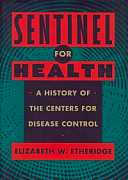 | Title: Sentinel for health: a history of the Centers for Disease Control Author: Etheridge, Elizabeth W Published: University of California Press, 1992 Subjects: History | Medicine Publisher's Description: In the only history of its kind, Etheridge traces the development of the Centers for Disease Control from its inception as a malaria control unit during World War II through the mid-1980s . The eradication of smallpox, the struggle to identify an effective polio vaccine, the unraveling of the secrets of Legionnaires' disease, and the shock over the identification of the HIV virus are all chronicled here. Drawing on hundreds of interviews and source documents, Etheridge vividly recreates the vital decision-making incidents that shaped both the growth of this institution as well as the state of public health in this country for the last five decades.We follow the development of the institution as it was transformed by the will and the imagination of remarkable individuals such as Dr. Joseph Mountin, one of the first heads of the CDC. Often characterized as abrasive and impatient, Mountin pushed the CDC to become a vital player in eradicating the threat of communicable disease in the United States. Others such as Dr. Andrew Langmuir brought the expertise necessary to establish epidemiology as one of the primary functions of the CDC.Created to serve the states and to answer any call for help whether routine or extraordinary, the CDC is now widely recognized as one of the world's premier public health institutions. [brief] Similar Items |
| 60. | 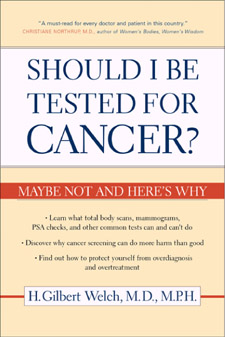 | Title: Should I be tested for cancer?: maybe not and here's why Author: Welch, H. Gilbert Published: University of California Press, 2004 Subjects: Medicine | Health Care | Disease Publisher's Description: Getting tested to detect cancer early is one of the best ways to stay healthy - or is it? In this lively, carefully researched book, a nationally recognized expert on early cancer detection challenges one of medicine's most widely accepted beliefs: that the best defense against cancer is to always try to catch it early. Read this book and you will think twice about common cancer screening tests such as total body scans, mammograms, and prostate-specific antigen (PSA) tests. Combining patient stories and solid data on common cancers, Dr. H. Gilbert Welch makes the case that testing healthy people for cancer is really a double-edged sword: while these tests may help, they often have surprisingly little effect and are sometimes even harmful. Bringing together a body of little-known medical research in an engaging and accessible style, he discusses in detail the pitfalls of screening tests, showing how they can miss some cancers, how they can lead to invasive, unnecessary treatments, and how they can distract doctors from other important issues. Welch's conclusions are powerful, counterintuitive, and disturbing: the early detection of cancer does not always save lives, it can be hard to know who really has early cancer, and there are some cancers better left undiscovered. Should I Be Tested for Cancer? is the only book to clearly and simply lay out the pros and cons of cancer testing for the general public. It is indispensable reading for the millions of Americans who repeatedly face screening tests and who want to make better-informed decisions about their own health care. [brief] Similar Items |